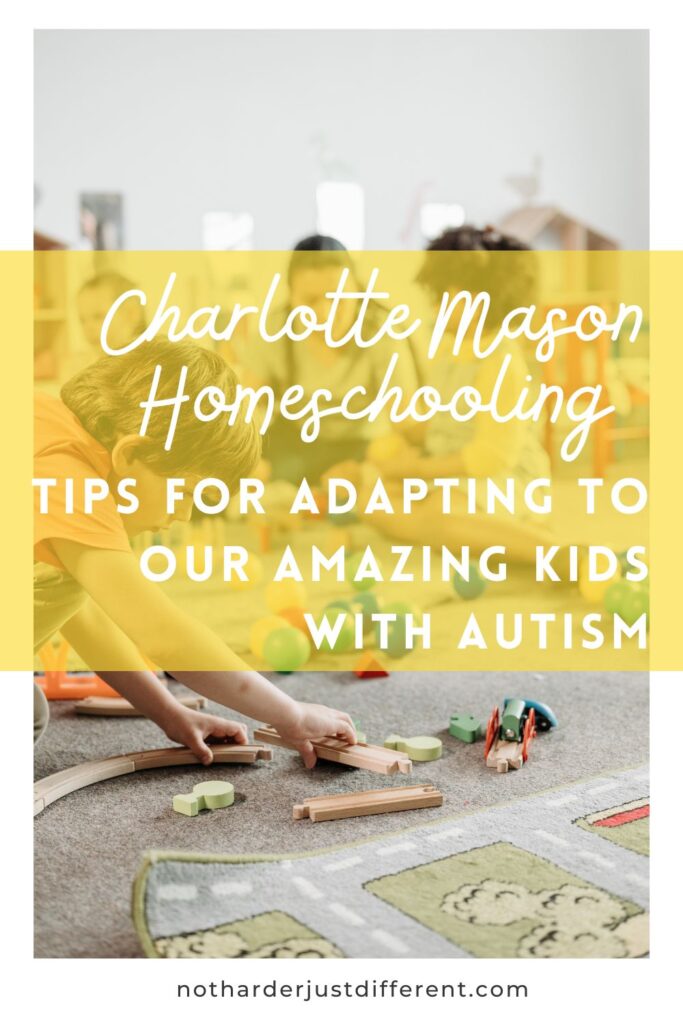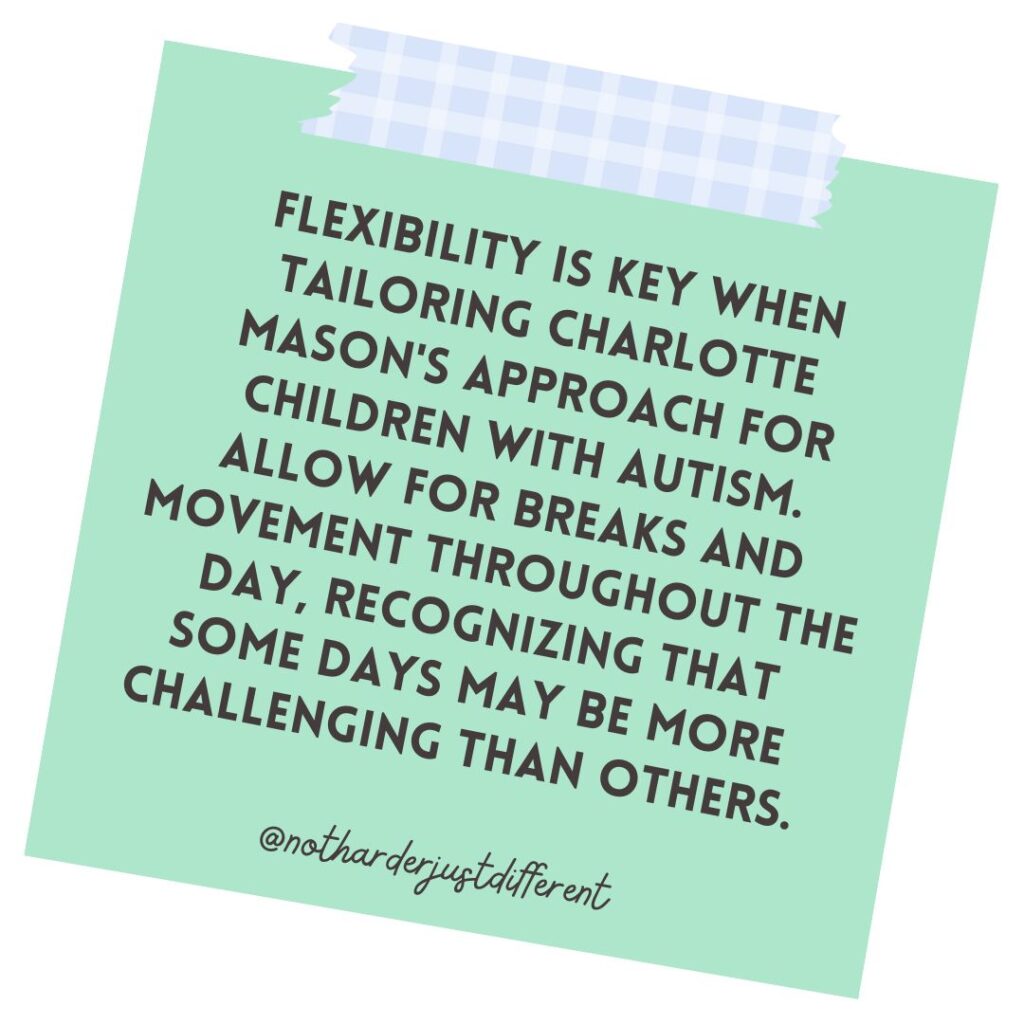Disclaimer: As a future Licensed Clinical Social Worker (LCSW) currently pursuing my master’s degree, I am passionate about sharing insights and information related to parenting, autism and homeschooling based on my personal experiences and research. However, the content shared on this blog is not intended to substitute professional advice, diagnosis, or treatment. Parenting is a deeply personal journey, and while I strive to provide valuable insights, every family and situation is unique. Readers are encouraged to consult with qualified professionals for personalized guidance tailored to their specific needs and circumstances.
Today, I want to dive into the world of Charlotte Mason homeschooling, especially tailored for our amazing kids on the autism spectrum. If you’re seeking a holistic approach that nurtures both the mind and soul, you’re in for a treat!
If you’re looking for meaningful learning experiences, a super gentle approach, especially to the early years, and lots of outdoor, nature inspired learning, Charlotte Mason may be the fit for you! thriving in an environment tailored to their unique strengths and needs.
Our third year of homeschooling was my big Charlotte Mason year. I read a few of Charlotte’s books, and I KNEW this was exactly the strategy that was going to work for Bug. Full disclosure: not everything about it did. Like with any method, we had to stretch and adapt and make it work for us. We’re not “purists” by any means, but there have been some fun things we’ve taken with us on our homeschool journey. That’s the magic of homeschooling. You can take what works and leave what doesn’t.
Now, let’s chat about why Charlotte Mason’s philosophy may be a game-changer for your child with autism.

Charlotte Mason Homeschooling for Children with Autism
Understanding Charlotte Mason Homeschooling
Charlotte Mason’s philosophy is rooted in the belief that children are born persons with an innate curiosity and thirst for knowledge. She advocated for a whole-child education that feeds the mind, soul, and spirit. Central to her approach are living books—rich, narrative-driven texts that captivate children’s imagination. Instead of dry textbooks, children are immersed in literature that sparks a love for learning.
Her method emphasizes the importance of short, focused lessons that respect the child’s attention span and developmental stage. Children are encouraged to engage with ideas, rather than merely memorize facts. Through narration, they learn to articulate their thoughts and express themselves with clarity and confidence. Charlotte Mason also placed great emphasis on the arts, nature study, and meaningful work, believing that these experiences nourish the whole child.
Why the Charlotte Mason Method Works Well for Children with Autism
The Charlotte Mason method offers several features that can be particularly beneficial for children with autism:
- Gentle and Nurturing Approach: The Charlotte Mason method emphasizes a gentle and nurturing approach to education, focusing on developing the whole child—mind, body, and spirit. For children with autism, who may be sensitive to stress and pressure, the calm and supportive atmosphere of Charlotte Mason homeschooling can create an optimal learning environment where they feel safe and valued.
- Emphasis on Living Books and Narration: Charlotte Mason advocated for the use of living books—rich, narrative-driven texts that inspire imagination and curiosity. For children with autism, who often have a strong preference for concrete and sensory-rich learning experiences, living books offer engaging and meaningful opportunities to connect with literature and explore new ideas. The practice of narration, where children retell stories or express their thoughts orally or in writing, promotes language development, comprehension, and communication skills.
- Nature Study and Outdoor Exploration: Charlotte Mason placed great emphasis on nature study and outdoor exploration as essential components of education. Spending time outdoors and engaging with the natural world can have profound benefits for children with autism, including sensory integration, stress reduction, and improved social skills. Nature study provides opportunities for sensory exploration, observation, and discovery, allowing children with autism to connect with their environment in meaningful and therapeutic ways.
- Short, Focused Lessons and Hands-On Learning: The Charlotte Mason method advocates for short, focused lessons that respect the child’s attention span and developmental stage. For children with autism, who may struggle with sustained attention and processing information, the bite-sized nature of Charlotte Mason lessons can help maintain engagement and prevent overwhelm. Additionally, hands-on learning experiences, such as nature walks, art activities, and handicrafts, provide opportunities for active participation and sensory exploration, enhancing learning and retention.
- Character and Habit Formation: Charlotte Mason emphasized the importance of character and habit formation in education, cultivating virtues such as attention, obedience, and perseverance. For children with autism, who may benefit from clear expectations and routines, the focus on character and habit formation provides structure and predictability, helping them develop essential life skills and self-regulation strategies.

Tailoring Charlotte Mason for Autism
Adapting Charlotte Mason’s principles for children with autism requires a thoughtful and individualized approach. Sensory sensitivity is common among children on the spectrum, so creating a sensory-friendly environment is crucial. Consider factors like lighting, noise levels, and seating arrangements to minimize distractions and promote focus.
Visual aids can be powerful tools for enhancing learning and comprehension. Use diagrams, charts, and pictures to supplement lessons and provide visual support. Visual schedules and routine cards help children anticipate transitions and understand expectations, reducing anxiety and promoting independence.
Flexibility is key when tailoring Charlotte Mason’s approach for children with autism. Allow for breaks and movement throughout the day, recognizing that some days may be more challenging than others. Celebrate small victories and progress, and be patient with yourself and your child as you navigate this journey together.
Practical Tips and Strategies
Creating a calm and structured homeschooling space sets the stage for success. Designate a quiet area free from distractions where your child can focus and engage with their lessons. Organize materials in a way that is accessible and visually appealing, making it easy for your child to navigate their learning environment.
Break lessons into manageable chunks, interspersed with hands-on activities and movement breaks. Use timers or visual timers to help your child understand the passage of time and transition between tasks. Incorporate sensory tools like fidget toys, weighted blankets, or sensory bins to promote self-regulation and attention.
Establishing consistent routines and rituals provides a sense of security and predictability for children with autism. Start and end each day with a familiar routine, incorporating activities that your child enjoys and finds calming. Be flexible and open to adjusting routines as needed to meet your child’s evolving needs.
Embracing Nature and the Outdoors
Nature is a powerful teacher and healer for children with autism. Spending time outdoors provides rich sensory experiences and opportunities for exploration and discovery. Nature calms the mind and soothes the senses, making it an ideal learning environment for children on the spectrum.
Take nature walks in your neighborhood or visit local parks and nature reserves. Encourage your child to observe and interact with the natural world, whether it’s watching birds, collecting leaves, or exploring the texture of tree bark. Use nature journals to document observations and create lasting memories of your outdoor adventures.
Engage all of your child’s senses during nature study—listen to the sounds of birds singing, feel the texture of leaves, and smell the fragrance of flowers. Encourage curiosity and wonder, and allow your child to lead the exploration at their own pace. Let nature be your guide as you embark on this enriching journey together.
Cultivating a Love for Living Books
Living books are the heart and soul of Charlotte Mason’s approach to education. Unlike dry textbooks, living books engage the imagination, evoke emotions, and inspire a love for learning. They bring history, literature, and science to life, making learning a joyful and meaningful experience.
When selecting living books for your homeschooling journey, consider your child’s interests, passions, and developmental level. Choose books that spark curiosity and ignite the imagination, transporting your child to different times and places. Look for well-written narratives, vivid illustrations, and rich language that capture the essence of the subject matter.
Read aloud to your child regularly, allowing them to immerse themselves in the beauty of language and storytelling. Encourage discussions and reflections, inviting your child to share their thoughts and insights. Make connections between the stories you read and your child’s own experiences, fostering a deeper understanding and appreciation of the world around them.
By embracing living books, you cultivate a love for literature that will enrich your child’s life and learning journey for years to come. Let the pages of these captivating stories be a gateway to adventure, discovery, and endless possibilities.
With Charlotte Mason homeschooling, the possibilities are endless. Embrace the beauty of simplicity, nurture your child’s love for learning, and celebrate every milestone along the way. Let the adventure begin!

